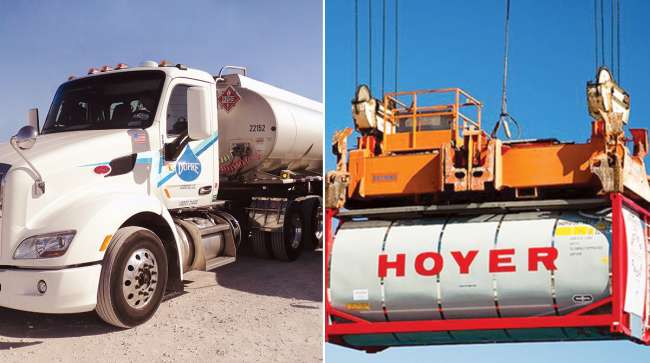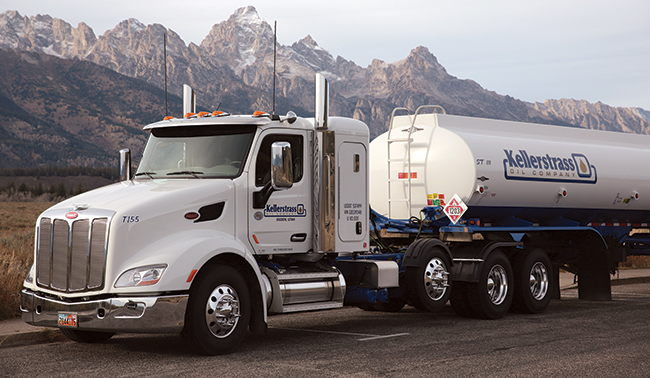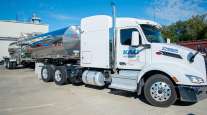Staff Reporter
Dupré Logistics, Hoyer Group Team to Create Hoyer Bulk

[Stay on top of transportation news: Get TTNews in your inbox.]
A pair of recent deals are reshaping the structure of companies that serve the energy and bulk-hauling sectors in North America.
Louisiana-based Dupré Logistics and Germany’s Hoyer Group on Jan. 15 announced a joint venture to create Hoyer Bulk, a Houston-based operation that Hoyer Group said will focus on transport of liquid products.
Dupré will control a 51% stake in the company, while Hoyer Group will hold a 49% stake. Both companies specialize in tanker-based transport of liquids and dry bulk.
“Partnership with Dupré is a logical expansion of our internationally aligned overseas activities by providing transport services in North America,” said Hoyer Group CEO Ortwin Nast in a statement. “We thereby enlarge our portfolio of services and also meet the growing demand for transport capacities in the North American market.”

Dupré president Mike Weindel added that the venture will improve first- and last-mile logistics in North America for both companies.
Dupré Logistics is a privately held company whose services include energy and chemical transport, dedicated truck transportation, site logistics and freight brokerage.
Dupré specializes in tanker, hazardous materials and petrochemical transportation. It operates more than 750 trucks, employs more than 800 drivers in its dedicated fleets and works with a network of more than 10,000 carriers. It serves all of the contiguous 48 U.S. states and parts of Canada and Mexico, according to the company website.
Based in Hamburg, family-owned Hoyer Group moves liquids by road, rail and sea, including chemicals, foodstuffs, gas and mineral oil using various tank containers as well as intermediate bulk containers. The company has about 6,200 employees in more than 115 countries and owns about 2,200 trucks.
Founded in 1946, it has had operations in the U.S. since 1980, according to its website.
Separately, Calgary, Alberta-based Parkland Fuel Corp. on Jan. 16 said it would through its Parkland USA subsidiary acquire Salt Lake City-based Kellerstrass Oil Co.
Kellerstrass is a regional retail dealer and commercial fuel business with 84 locations spread across Utah, Idaho and Wyoming. In addition to its trucking, routing and distribution capabilities, Kellerstrass owns a 17-car rail spur, Parkland said.

A Kellerstrass Oil tanker. (Kellerstrass via LinkedIn)
“We expect this acquisition will support the growth of our North America diesel platform, create supply efficiencies and deliver logistical benefits,” Parkland USA president Doug Haugh said in a statement. In particular, he noted that the deal marks Parkland’s entry into Idaho and expands its presence in Wyoming.
These deals come at a time of difficulty for some in the tanker sector.
Earlier this month, Borden Dairy Co. filed for bankruptcy protection citing a weakening of milk demand. It followed milk producer Dean Foods, which filed for bankruptcy in November.
In October, Houston-based oilfield service supplier Halliburton Co. laid off 650 people because of weaker demand in the shale sector, according to Bloomberg News.
In September, Stevens Transport of Dallas shuttered its tanker division after fairly low and stable oil prices led to a decline in demand for two major fracking needs: water and sand. The carrier laid off 586 employees.
But services for oilfields and dairy farms are only two aspects of the diverse tanker sector, according to Daniel Furth, president of the National Tank Truck Carriers Inc. To protect against the volatility in one market, tanker companies often diversify their cargo.
“Generally speaking, we have all sorts of natural hedges that ... allow tank truckers to survive in all types of markets,” Furth said.
Products that can be hauled by tank include gasoline, chemicals, detergents, fructose and dry bulk items such as flour, Furth told Transport Topics.
Paint also is a favorite cargo of tanker trucks, and Furth noted his members watch housing starts closely. But even in a down housing market, paint is needed for renovations and maintenance, he said, making it a product usually in demand.
Furth said with the diversity and hedging, tanker truck companies should be able to keep busy.
“Generally speaking, we are in decent shape,” Furth said.
Want more news? Listen to today's daily briefing:


